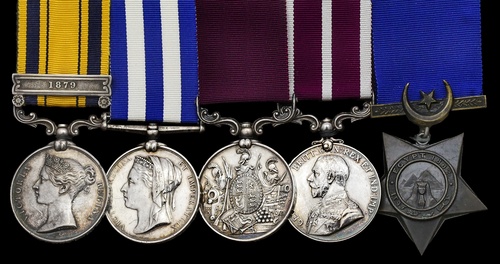
Auction: 17001 - Orders, Decorations and Medals
Lot: 176
(x) A rare M.S.M. group of five awarded to Staff Armourer Sergeant H. Proctor, Corps of Armourers, who witnessed much active service with the King's Royal Rifle Corps, including the First Anglo-Boer War
South Africa 1877-79, 1 clasp, 1879 (2419 Armr. Sgt. H. Proctor, 3/60th Foot); Egypt & Sudan 1882-89, dated reverse, no clasp (2419 Armr. Sgt. H. Proctor, 3/K.R. Rif. C.); Army L.S. & G.C., V.R., 3rd issue (252 Armr. Sgt. H. Proctor, K. Rl. Rif. C.); Army Meritorious Service Medal, G.V.R., 1st issue (S. Armr. Sgt. H. Procter, C. of Arms.); Khedive's Star 1882, slight edge bruising and light contact marks, very fine and better (5)
Henry Proctor was born in Aston, Birmingham in 1845. A gunsmith by occupation, he enlisted in the Corps of Armourers at Pimlico, London in November 1864, aged 21 years.
In March 1866, he was posted as Armourer Sergeant to the 3/60th Royal Rifles, the same year in which he was embarked for India. Up Proctor's street during the Battalion's Indian sojourn was the issuance of converted Snyder breech-loading rifles in August 1871; these were exchanged for Martini-Henry rifles in October 1874, following the unit's return to England.
In February 1879, 3/60th was ordered to South Africa, where it crossed the Tugela at the end of March. Hotly engaged at the battle of Ginginhlovo on 2 April, the Battalion suffered a number of casualties, including Brevet Lieutenant-Colonel F. V. Northey, who was mortally wounded. Having then established Fort Chelmsford and undertaken much convoy work to Fort Pearson, the Battalion encamped at Ulundi to assist in the search for King Cetewayo; a party was also detached to Isandhlwana on burial duties under the Rev. J. M. Richie.
In December 1880, with the advent of the First Anglo-Boer War, 3/60th was mobilised in General Sir George Colley's force and were present in the costly actions at Laing's Nek and Ingogo in January 1881; two companies of the Battalion were also present in the disastrous action at Majuba. The Battalion was subsequently embarked for Malta.
In July 1882, Proctor and his comrades returned to active service in Egypt, where a number of men were employed in the Mounted Infantry and saw action at Magfar, Kassassin and Tel-el-Kebir; Proctor was not among them and received the Medal without clasp.
Returning to England in December 1882, he was posted to the Corps of Armourers Depot and was advanced to Staff Sergeant Armourer in April 1883.
In 1887, he joined the King's Royal Rifle Corps depot in Winchester, and it was in this capacity that he was awarded his L.S. & G.C. Medal in AO 37 of 1 February 1888.
On being discharged after 25 years with the Colours in November 1889, Proctor settled back in Aston, Birmingham, where he found employment as a gunsmith. Awarded the M.S.M. with an annuity of £10 in AO 367 of 1920, he died in the last quarter of 1924; sold with an extensive file of copied research, from which the above biographical entry has been taken.
Subject to 5% tax on Hammer Price in addition to 20% VAT on Buyer’s Premium. For more information please view Terms and Conditions for Buyers.
Sold for
£1,600




